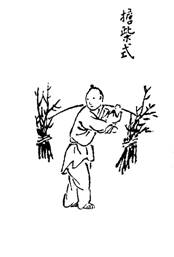ZEN IRODALOM ZEN LITERATURE
« Zen főoldal
« vissza a Terebess Online nyitólapjára
華嚴休靜 Huayan Xiujing (9th cent.)
of Huanan Temple in Jingzhao
(Rōmaji:) Kegon Kyūjō
Tartalom |
Contents |
| Hua-jen Hsziu-csing mondásaiból Fordította: Terebess Gábor |
Chan Master Xiujing of Huayan Chan Master Jingzhao Huanan Si Xiujing |
Chan Master Xiujing of Huayan
五燈會元 Wudeng huiyuan 13.244a-b.
Translated by Ronald Egan
The Essence of the Five Lamps entry on Chan Master Xiujing of Huayan contains the following exchange: "A disciple asked, 'What if our great army presents sacrificial offerings to the King of Heaven, asking that it be victorious in battle, and the enemy army does the same, asking that it be the victor. Which request will the King of heaven honor?' The master replied, 'When Heaven sends down rain and dew, it does not choose between luxuriant and parched plants.'”
Chan Master Jingzhao Huanan Si Xiujing (Kegon Kyūjō)
in: Records of the Transmission of the Lamp: Volume 4: The Shitou Line (Books 14-17), Translated by Randolph S. Whitfield, Kindle Edition, 2017
Chan master Xiujing of Huanan Temple in Jingzhao (Shanxi, Xi’an) was once the second-in-charge at Lepu’s (16.415) place. On one occasion there was the sound of a mallet being struck and Pu said, ‘Above, moving firewood, below, hoeing the ground.’
The head of the meditation hall asked, ‘What is the venerable monk doing?’
‘Whilst in the meditation hall, not sitting straight and not going around here and there at random,’ replied the master.----------------
When the master was at Dongshan’s he asked him, ‘A student who has not yet seen into the principle of the path is not yet free from a feeling of knowing.’
‘Are you also still concerned with the principle of the path?’ replied Dongshan.
‘Concerned with there being no principle to the path,’ said the master.
‘So where does the feeling of knowing come from?’ asked Dongshan.
‘This is the question the student has just posed,’ replied the master.
‘Then it is necessary to roam for ten thousand li through a place in which not an inch of grass grows,’ said Dongshan.
‘Is it really necessary to be in a place where not an inch of grass grows?’
‘Just go directly!’ said Dongshan.----------------
Once, whilst carrying firewood, Dongshan asked the monk in charge of the firewood, ‘When meeting each other on a narrow path, what to do?’
‘It would be best to skirt around!’ answered the master.
Dongshan said, ‘You should remember my words – if you are going to live in the south there will be a thousand disciples, if living in the north, two or three hundred only.’
The master lived first in Huayan Temple on Mount Dong in Fuzhou. Not long afterwards Emperor Zhuanzong (r. 923-6 CE) of the Later Tang dynasty summoned the master to court, where he delivered great clarifications on the profound Chan ethos. His disciples consequently were three hundred in number.
----------------Question: ‘The meaning of the patriarchs and meaning of the teachings, are these two the same or different?’
‘Even finding and exhausting the treasury of the dragon’s palace, its meaning could never be explained fully,’ said the master.
----------------Question: ‘Why does someone greatly awakened still get confused?’
‘A broken mirror cannot reflect the light and falling petals find it difficult to climb back up to their branches,’ said the master.
----------------Question: ‘A great army offers sacrifices to the Heavenly King and petitions for victory; a rebel army also sets up sacrifices to the Heavenly King in order to petition for victory. What is not yet clear is to whom the Heavenly King will grant the petition?’
‘Heaven lets fall showers of dew and does not choose between green growth and withered growth,’ said the master.----------------
One day the Emperor’s sedan came into the temple amidst perfumed incense. The Emperor asked, ‘What spirit is this?’
‘It is the virtuous spirit, Protection of the Dharma,’ said the master.
‘Where to go in these times of sifting out and reducing the numbers [of Buddhist monks]?’ asked the Emperor.
‘Heaven lets fall showers of dew and does not differentiate between green growth and withered growth,’ replied the master.----------------
Later the master travelled to Heshuo in Pingyang (Shanxi, Linfeng) where he revealed his cessation. The cremation yielded śarīra relics for which four pagodas were set up, the first in Jinzhou (Shanxi), the second in Fangzhou (Hubei, Fang Xian), the third in Xiaoyao Monastery in Nanshan and the last in Huayan Temple in Nanshan. By imperial decree the master was conferred with the posthumous title of ‘Great Master of Rare Wisdom’ and the pagoda was ‘Pure Action’.
Hua-jen Hsziu-csing összegyűjtött mondásaiból
Fordította: Terebess Gábor
Vö.: Folyik a híd, Officina Nova, Budapest, 1990, 83, 90. oldal
Egy szerzetes azt mondta Hua-jennek:
– A hűséges hadsereg oltárt emel az égi királyoknak, és győzelemért fohászkodik; a lázadó hadsereg is oltárt emel az égi királyoknak, és győzelemért fohászkodik. Melyik fohász teljesül?
– Az égi eső egyformán áztatja a kiszáradt és az öntözött földeket – mondta Hua-jen.
Hua-jen rőzsenyalábokat cipelt a vállán.
– Mit csinálsz akkor – kérdezte tőle Tung-san –, ha valaki szembejön veled egy keskeny dűlőúton?
– Szívesen visszafordulok – mondta Hua-jen.

Fametszet a Mustármag-kert (1679-1701) festészeti kézikönyvből